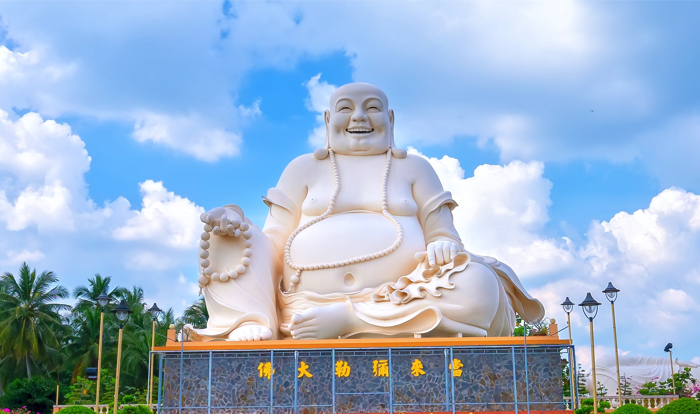Translated By Andrew Yang
Everyone wants to find happiness and enjoy it, but all happiness in this world is transitory and short-lived. So, what is true, permanent and absolute happiness? To find out, let us look at a set of three parallels: the pleasures based on five types of human desire, the heavenly joy of Chan and finally, the otherworldly bliss of Nirvana.
First of all, what are the pleasures resulting from satisfying human desire? Human beings, obsessed with enjoying themselves, think that the most pleasurable things in life are none other than wealth, sex, fame, food and sleep. To enjoy themselves, they crave for wealth and material possessions, often in the grip of an obsession with good-looking men and women and a life of sensual and carnal gratification. What is more, they are determined in a pursuit of status and reputation, they tend to eat and drink without moderation, even resorting to the slaughter of animals for food, and they indulge in being idle and indolent. Such human desires are what motivates people in the mortal world. The raging thirst in craving, the fury and desperation in pillaging and plundering, and the foolishness and infatuation in being consumed with acquisition and ownership, these are all manifestations of what is known in Buddhism as the three unwholesome root klesas, i.e., greed, aversion and delusion. One should also note that desires are hard to fill, and the constant hunt for gains and perpetual worrying about losses out of one’s control can be painful. Even after gaining possession, things may not be enjoyed for long, and once lost, the momentary pleasure turns into agony once more. To be sure, pleasures in the human world are empty in nature and impermanent.
Secondly, there is the heavenly joy of Chan. The Desire, Form and Formless Realms encompass a total of twenty-eight heavens, each inhabited by celestial beings enjoying blessing and happiness to different degrees. While there is still lust in the six heavens of the Desire Realm, in the eighteen heavens of the Form Realm, the lust of men and women and their basic need for food and drink have been eliminated, although there is still matter, desire and initial joy of Chan. Going up to the four heavens of the Formless Realm where emptiness reigns, all material gains and ownership are annihilated, celestial beings there no longer retain a physical body, and with nothing but a sublime joy of Chan, their life is completely immersed in inner spiritual delight, which is tens of thousands of times greater than that in the human world. With a lifespan measuring tens of thousands of years long, they live in no pain but sheer lasting joy. On the other hand, their celestial blessing and joy of Chan do have an end point, and when that arrives the celestial inhabitants still have to reincarnate, meaning that they cannot escape life and death after all. Thus, Buddhist scriptures have this to say, “Even if cultivation takes one up to the heaven of neither thought nor non-thought, the highest heaven in the Realm of Formlessness, it is still not as worthy as one single trip to the West”.
Third and last, the supramundane bliss of Nirvana, a Sanskrit word meaning the perfection of one’s wisdom and virtue and the extinction of one’s affliction, culminating in the attainment of an absolute state of eternal ecstasy free of germination and termination. The concept of Nirvana, being a convenient teaching device, is relative to those of life and death. It is, because of germination and termination, employed to depict a state of neither germination nor termination. When one truly enters into Nirvana, then the knower implicitly merges with the known, with the actor and the acted-upon both no more. By then, not only are the notions of life and death no longer obtainable, neither is that of Nirvana, as this state of enlightenment is something that may only be enjoyed by the cultivator themselves but is not describable in words, and consequently its happiness is transcendent, absolute and eternal. Hence, we know that the bliss of Nirvana may only be undergone by the attainer alone, and is not amenable to transmission by word or concept.
Furthermore, neither worldly pleasures nor the heavenly joy of Chan is comparable to the bliss of Nirvana. As Buddha told us, while they do enjoy happiness, even celestial beings are subject to eventual further transmigration through death and rebirth. Only transcendent Nirvana is the seat of absolute and eternal happiness.
Once upon a time, there lived a King Pu’an who was a Buddhist. One day, he invited four kings from neighboring countries to dine and discuss the happiest thing to do in life. Of the four kings, A said travel, B said listening to music together with one’s lover, C said owning riches and all that one could wish for, and D said having supreme power that controls everything. King Pu’an disagreed with them all. “What you’ve chosen,” he said, “are all sources of sorrow and roots of suffering, and have nothing to do with true happiness. You must know that elation breeds misery and out of joy comes suffering. If one gains power, they bully others, and when one loses power, they suffer humiliation. Nothing but attaining awakening by placing one’s faith in Buddha with neither desire nor defilement is indeed happiness in life first and foremost”.
Buddha views life as a dream while mortals indulge themselves in it thinking it is ever real. As stated in Buddhist scriptures, no one from mortals to bodhisattvas leaves their dreamland, except for Buddha who, having cast off all trouble with unwholesome habits, was awakened from that dream and went on to attain ultimate Nirvana.

